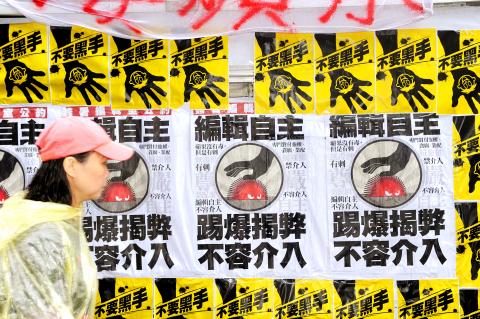Cheng Hung-yi (鄭弘儀), the former host of popular political television program the Talking Show (大話新聞), yesterday raised concerns over the drastic changes in and sinicization of Taiwan’s media environment, which he said could jeopardize the nation’s freedom of the press.
The talk show was suspended in May by SET-TV, allegedly due to its pro-localization stance and harsh criticisms of China.
“Recent changes in Taiwan’s media environment have been unsettling, particularly the stifling of pro-localization voices and apparent leaning toward Chinese government mouthpieces, such as the People’s Daily, Xinhua news agency and the China Central Television,” Cheng said.

Photo Sam Yeh, AFP
Cheng said these changes could be seen in the growing domination of pro-China rhetoric in Taiwan’s printed outlets, as well as the Taiwanese media’s staying mum on China-related issues.
“People could see this China favoritism in local [Taiwanese] newspapers each day during the Chinese Communist Party’s 18th Party Congress,” Cheng added.
Cheng made the remark on the sidelines of the launch of political commentator Chung Nien-huang’s (鍾年晃) new book, My Talking Life (我的大話人生), yesterday in Taipei. Chung was a regular guest on the Talking Show.
The event was also attended by Ellen Huang (黃越綏), a former national policy adviser to former president Chen Shui-bian (陳水扁), and the director of the Democratic Progressive Party’s Democracy Academy, Ho Po-wen (何博文).
Chung said Chinese influence had permeated the operations of the talk show long before it was suspended.
In his new book, he revealed that the management of SET-TV had gradually put restrictions on the talk show, which used to trumpet its pro-localization stance.
“At first, the head of the TV station, citing his business ties with Chinese firms, asked the program to tone down its criticisms of China. Then, the show was forbidden from making any reference to issues pertaining to Tibet, the 1989 Tiananmen Square Massacre and Falun Gong,” Chung said.
“The interference culminated with the program’s permanent suspension in May,” Chung said, adding that the fall of the Talking Show was only the tip of the iceberg.
“Chinese capital is now sinking its claws into more Taiwan-based television stations, manipulating their operations and risking the freedom of the press that Taiwanese pride themselves on,” he said.
Chung, a former journalist who used to work for the Chinese--language Apple Daily, said the impact of increasing Chinese capital in Taiwanese media was starting to be felt, giving as an example a proprietor of a China-based media outlet he met three months ago who said he only read the Chinese-language Liberty Times (Taipei Times’ sister paper) because “other Taiwanese papers were not much different from [China’s] People’s Daily.”
“What the Taking Show faced is similar to what the country as a whole is facing, and we are doomed to be swallowed and shut down by China, regardless of how good the quality of our media is,” Chung said.

Taiwanese can file complaints with the Tourism Administration to report travel agencies if their activities caused termination of a person’s citizenship, Mainland Affairs Council Minister Chiu Chui-cheng (邱垂正) said yesterday, after a podcaster highlighted a case in which a person’s citizenship was canceled for receiving a single-use Chinese passport to enter Russia. The council is aware of incidents in which people who signed up through Chinese travel agencies for tours of Russia were told they could obtain Russian visas and fast-track border clearance, Chiu told reporters on the sidelines of an event in Taipei. However, the travel agencies actually applied

Japanese footwear brand Onitsuka Tiger today issued a public apology and said it has suspended an employee amid allegations that the staff member discriminated against a Vietnamese customer at its Taipei 101 store. Posting on the social media platform Threads yesterday, a user said that an employee at the store said that “those shoes are very expensive” when her friend, who is a migrant worker from Vietnam, asked for assistance. The employee then ignored her until she asked again, to which she replied: "We don't have a size 37." The post had amassed nearly 26,000 likes and 916 comments as of this

New measures aimed at making Taiwan more attractive to foreign professionals came into effect this month, the National Development Council said yesterday. Among the changes, international students at Taiwanese universities would be able to work in Taiwan without a work permit in the two years after they graduate, explainer materials provided by the council said. In addition, foreign nationals who graduated from one of the world’s top 200 universities within the past five years can also apply for a two-year open work permit. Previously, those graduates would have needed to apply for a work permit using point-based criteria or have a Taiwanese company

The Shilin District Prosecutors’ Office yesterday indicted two Taiwanese and issued a wanted notice for Pete Liu (劉作虎), founder of Shenzhen-based smartphone manufacturer OnePlus Technology Co (萬普拉斯科技), for allegedly contravening the Act Governing Relations Between the People of the Taiwan Area and the Mainland Area (臺灣地區與大陸地區人民關係條例) by poaching 70 engineers in Taiwan. Liu allegedly traveled to Taiwan at the end of 2014 and met with a Taiwanese man surnamed Lin (林) to discuss establishing a mobile software research and development (R&D) team in Taiwan, prosecutors said. Without approval from the government, Lin, following Liu’s instructions, recruited more than 70 software